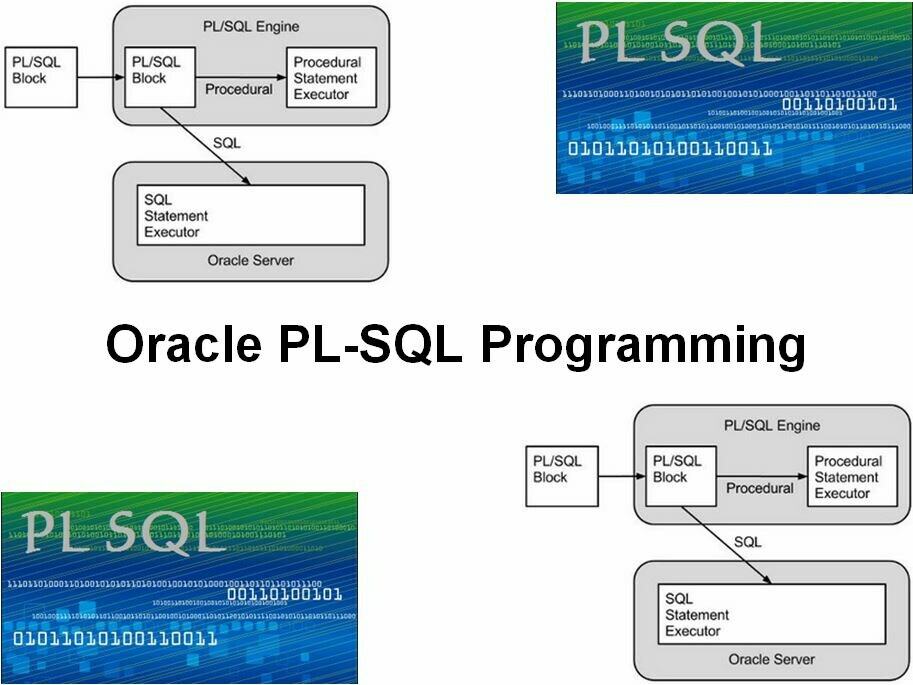-
Learning by doing
-
Trainers with practical experience
-
Classroom training
-
Detailed course material
-
Clear content description
-
Tailormade content possible
-
Training that proceeds
-
Small groups
In the course PL-SQL Programming participants learn to program in PL-SQL, Oracle's procedural programming language. PL-SQL is similar to the query language SQL, but extends the possibilities of SQL and improves performance. This course focuses on the latest version of Oracle, but where necessary, features of older versions are specially indicated.
The course Oracle PL/SQL Programming starts with a discussion of the presence
of PL-SQL in the various Oracle tools. The advantages of using PL-SQL are explained.
Attention is then paid to the syntax of PL-SQL, the structure of PL-SQL programs and to statements, declarations and expressions.
Control flow in PL-SQL with if else and case statements and the various loop constructions are also covered.
Then the course proceeds with explaining what cursors are and how they are used when accessing the database. Implicit cursors and cursor attributes are then treated.
Attention is also paid to PL-SQL transactions. This involves executing or reversing an atomic set of SQL data manipulation statements in their entirety using commit or rollback.
Furthermore error and exception handling in PL-SQL are covered. Allowing exceptions and error parameters to occur are part of the course.
Some more advanced topics such as the creation and calling of local and stored procedures are discussed as well.
The use of packages that group related PL-SQL types, variables and subprograms is also on the program of the course Oracle PL/SQL Programming.
Finally attention is paid to triggers. Triggers are programs that are automatically fired when certain events occur.
The course Oracle PL-SQL Programming is designed for developers who want to use PL-SQL in applications that access an Oracle database.
In order to participate in the course Oracle PL-SQL Programming knowledge of and experience with the SQL query language is required for this course. Experience with programming in a procedural programming language is beneficial to the understanding.
The theory is treated on the basis of presentation slides. Demos are used to explain the theory. There is ample opportunity to practice and theory and exercises are alternated.
Attendants receive a certificate of participation in Oracle PL-SQL Programming after successful completion of the course.

Module 1 : PL-SQL Intro |
Module 2 : PL-SQL Syntax |
Module 3 : Control Flow |
| What is PL-SQL Strenght of PL/SQL Basic Concepts Procedural possibilities Enhanced performance Oracle Suppport tools Oracle Specifics SQL Developer |
PL-SQL Structure Statements Declarations Assignments %TYPE and %ROWTYPE Expressions Comments NULL |
IF-THEN-ELSE statement CASE statements GOTO WHILE loops FOR loops with index FOR loops with cursor Infinite loops Nested blocks |
Module 4 : Cursors |
Module 5 : Transactions |
Module 6 : Error Handling |
| Implicit cursor Query with SELECT INTO Query with cursor OPEN-FETCH-CLOSE FOR loops with cursor Cursor attributes |
Transaction in PL-SQL Queries for Changes Autonomous Transactions Locking Read Consistency Self Defined Records |
Exceptions RAISE EXCEPTION_INIT SQLCODE SQLERRM Parameters |
Module 7 : Procedures and functions |
Module 8 : Packages |
Module 9 : Triggers |
| Local versus stored procedures Parameters DEFAULT values Removing procedures Local and stored functions Functions in SQL Dependencies Recompilation Remote dependencies |
Benefits of Packages Package specification Package body Calling a function in SQL RAISE_APPLICATION_ERROR DESCRIBE Removing Packages NDS Packages Standard packages for SQL |
DML-triggers Statement triggers Row triggers Trigger Limitations Data integrity Cascading triggers System Event en DDL-triggers Triggers on user logon and logoff Shutdown and startup triggers |
